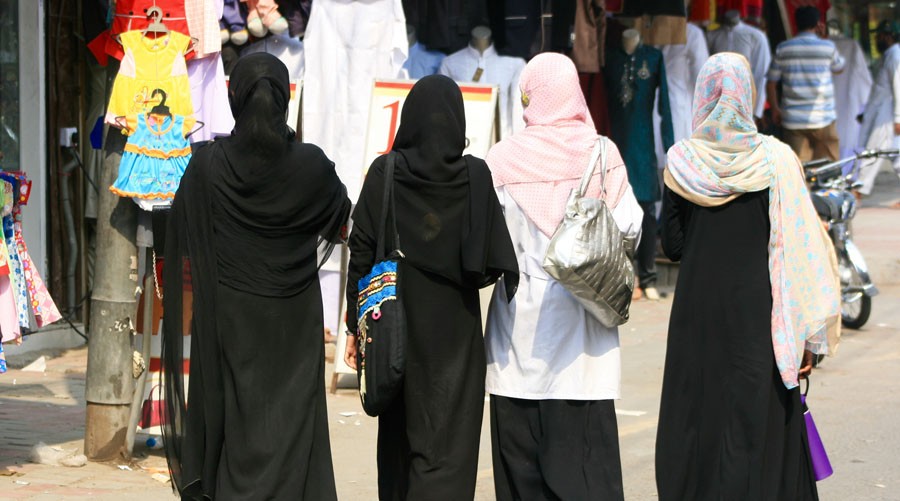
A chat with women in a park wearing abayas and hijab to know if their dress code makes mobility easier for them

At 8am, this woman-only gym in a park in Lahore is abuzz with activity. There are about ten or more women, actively using one machine or the other. Most of them are in their abayas; only a couple aren’t. This comes as a surprise because I thought these women walked on the jogging track and went back home. But here they are, perfectly at ease with the workout they are doing with each other’s help.
Women in abaya and hijab have become a lot more noticeable in the public sphere in recent years. Their visibility in colleges and universities, behind the counters in shops, in corporate offices, and in gyms and parks has stirred the debate that a particular kind of attire is facilitating women’s mobility. There are no statistics to confirm that abayas facilitate mobility, because this modest uniform-like dress, mostly black, also tends to make women appear more prominent, leading to the impression that, perhaps, more women are stepping out of their houses.
There is huge debate around women’s decision to cover themselves in abayas, hijab, niqab, headscarves, burqa in recent years. Whether it is to fulfil God’s instructions as claimed to be stipulated in scriptures, or to assert their Muslim identity in alien cultures, to challenge the feminist discourse that sees it as an expression of oppression or a mere exercise of choice to affirm certain values, the debate remains complex. There are thinkers who remain critical of projecting and accepting this image of women as ‘sinners’ and complain how this ‘voluntary’ adoption of a certain dress code is akin to rejecting progressive values including women emancipation and gender equality.
Away from this complexity, though not completely aloof from it, sometimes you want to seek answers to simple questions from these women in the park: Why do they decide to cover themselves in a certain way? Is it forced upon them, by faith or family or both? Does it make mobility easier? And a related question: Do they ever think of themselves as equal to men, especially since they have to dress in a certain manner while men don’t?
Unlike the common perception, hijab and abaya are more fluid choices, for instance some women claimed they have adopted it only recently, some began by covering their faces and then could not bear that anymore and, as opposed to the women specifically chosen for this conversation, there may also be some who stopped wearing abayas and reverted to their former attires.
They are almost unanimous in holding this up as a personal choice and not something imposed. These are middle class women, mostly married and housewives, whose reasons for wearing abayas may vary.
The conformism and ease of being part of a group helps. After all, they are switching to something that’s all too familiar. They all use the word "comfortable". A young girl, not even twenty and recently married, says that "given the conditions (mahol), all women want to make themselves comfortable". But "it has also become fashionable to wear abaya. So you can cover yourself and act fashionable too. For instance, the now popular maxi-dress abaya; there are so many designs available".
She explains what comfortable means: "The chadar and dupatta are difficult to handle. This is easy: we wear it like a gown, pin up the scarves and we are good to move around". But don’t the men still stare? "Yes it’s said the more you cover yourself, the more men gaze at you," she smiles.
Another one on the exercise bike, in her mid thirties, claims she feels "more safe" in abaya. "Clothes sometimes cling to the body awkwardly. I may be wearing anything underneath but I can go out in my abaya. It’s easy, comfortable." For her, it all started ten twelve years ago when she went for hajj with her husband. "People there told my husband that everyone looks at your wife; she is so beautiful. Make her wear a niqab (face veil). But I can’t wear niqab, so I started wearing abaya."
Read also: Editorial
When asked about what she thought about equality between genders, she retorts: "We can’t be equal to men. God has given them this power. They earn money while we stay at home". Both she and her sister-in-law wear abayas with diamantes. But another woman, who is about 40 and clearly comes from an upper economic and educational background, prefers them simple. "It’s very comfortable. Till three years ago, I didn’t even wear a dupatta. I started with a scarf and then the abaya. I had depression and did lots of things to cure it including yoga. Then I went to Al-Huda, started reading the Quran and made friends there. Women feel protected in abayas. Besides, this is ordained by God. I am reading Quran with translation and tajweed (set of rules for recitation) but not tafseer."
But women do like to dress up, no? "Yes I too am constantly thinking of the colours of abayas I want to buy next. But the body contours should not be prominent. Besides, at our parties in Al-Huda, women come wearing jeans and tights, we swim as well. I don’t wear niqab; it feels like I won’t be able to breathe."